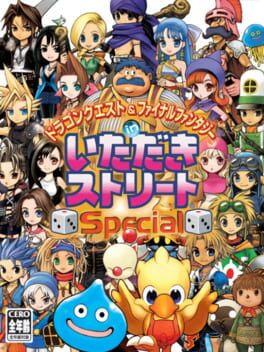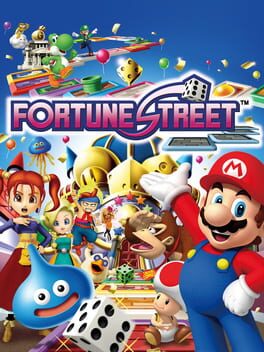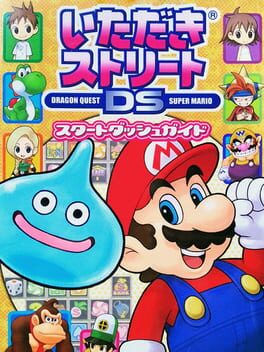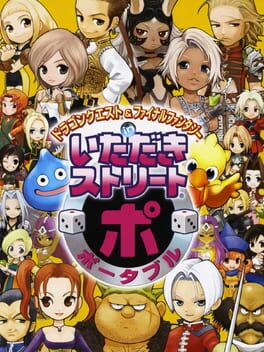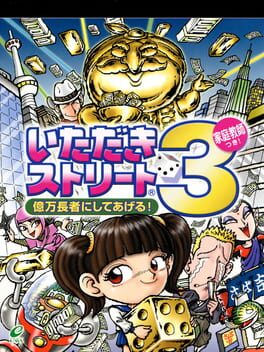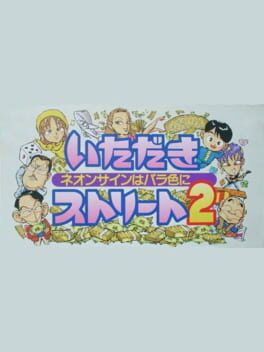

The game is similar to Monopoly in that players roll one die to advance around a board, purchase an unowned property they land on and earn money when opponents land on the player's property. The game differs from Monopoly in that players can buy and sell stocks of a block, affecting the value of block's stock up by buying or down by selling that block's stock or by developing a player-owned property of that block which increases the value per share for that block's stock. Also unlike Monopoly, it is not necessary to own the entire block to develop a property, though controlling more than one property of a block allows the player to develop their properties into larger buildings to collect more from opponents when they land on them. Players must collect a set of four suits, heart, diamond, clover and spade, to level up and collect additional gold when the pass the starting position/bank. To win a player must make it back to the bank with the board's required amount, which includes the total value of the player's stocks, property value, and gold on hand.
Also in series
Reviews View More
Itadaki Street is a variation to the popular game Monopoly. It's the same sort of idea, going around a board trying to get properties in a set to gain a monopoly there all in an effort to earn more money than your opponents, but Itadaki Street adds some very significant changes beyond the fan service to really make it a far more compelling board game. Firstly, there are many maps with different shop values and gimmicks in each. Some maps are more circuit-like, but many have multiple paths, meaning that there is often some element of player choice in how to best utilize their die rolls. You also don't just need to get back to GO (in this case, the bank) in order to get your free payday, and instead must collect 4 playing card suits from around the board, and knowing when trying to get your paydays isn't worth it can be a really big deciding factor in your victories. Another big change is how districts don't increase in value as you go around the board, with shops instead having varying values within each district that can go from 80 gold to 800 gold for the base market price. These spaces can even be outright taken (at great cost) with a hostile takeover after you land on them, at least if you're wiling to pay five times the current market price of the property. There are also casino spaces where you can play little minigames (sometimes alone, sometimes with the other players) for a little boost of extra quick cash.
The most significant change, though, is how Itadaki Street has a stock exchange system. You can only buy stocks at the bank, but you can sell them anywhere. Factor that in with how you can invest in a property even if you only own a single property in that district (think like building houses in Monopoly) and how you can buy stocks in ANY district, not just your own, and there is a LOT of strategy on when and how to invest your money. There is even a good strategy on when to divest yourself, as slowly selling off stocks in the district of a player ahead of you (something my friends and I call "investment bullying") to make their more numerous stocks lose value, meaning they'll take longer to hit the target goal of net worth they need to win the game.
There is still a lot of luck in this game, don't get me wrong. Landing on the space a suit sits on will get you a chance card, and some chance cards are so good they can easily turn the tide of the game (or at least give you a very healthy lead quite early on if it's something like a free payday from the bank). Then there are special "empty plot" property spaces, where you can build special buildings that have different effects depending on the type you build and what you do with it. These spaces are incredibly overpowered, and those who control them often control the game (with some buildings like the temple making the player that lands on them lose 10% of their NET WORTH to the player who owns it). You can absolutely get hecked over by bad luck in this game, but it's still possible to play from behind and come out in second or even end up winning if you play your investments right in most games.
After finishing the main single-player mode, you unlock another tournament set of the same boards but with "Sphere Mode" rules. Sphere Mode introduces a lot more opportunity for calculated risk, as it gives each player a Sphere Die to roll after they've done their normal move. You can find certain spheres as you play the maps to slot into your Sphere Die, and rolling it gives you the benefit of that sphere whether you like it or not (you may not always want to roll again immediately, for example). It's a neat idea, but it added a bit too much randomness for me to want to engage with after having just beaten all of those maps, even if half of the unlockable characters in the game are locked behind winning that second set of tournaments.
The appeal of this particular entry, at least historically, is that it was not only the first game where four players could play together, but it was the first one to have licensed characters in it. Flexing their Dragon Quest and Final Fantasy franchises, the game has 20 playable characters with another 16 unlockable ones. The characters don't have any differences between them other than aesthetics (although I think they do have different mechanics on the Sphere Mode boards), at least for player characters. Different characters have different levels of AI difficulty inherent to their characters instead of the AI being able to be assigned manually. The AI also isn't super amazing even on S Rank difficulties, and I've seen some of the AI do massively foolish things even at that high difficulty. It's not dead easy by any means, but it can really surprise with how foolish it is as times regardless.
The series representation is both very good and quite disappointing. For Dragon Quest, it has a really good variety from DQ1 all the way to DQ8 and even Terry from DQ Monsters. From Final Fantasy, however, there isn't a single character from before FF7, and there are even TWO Yunas in the game (FFX-2 Yuna and FFX Yuna). It's not a super big deal, but for a game where the fan service is so fun with how much silly personality the characters have to them when they do their lines as NPCs, it's disappointing to see how heavily stacked the newer games are all for the effort of promoting Squenix's newer games (like FFXII, which wouldn't even be out for another year and a half).
Verdict: Highly Recommended. I really loved my time with this game. It's got silly and fun writing, good mechanics, and tons of boards and characters to play with. While it's a bit hard to recommend this particular version to anyone who can't speak Japanese, the Wii game is well worth tracking down if the mechanics of this sound appealing to you. Enix hit a good formula here, and it's good to see Square Enix not seriously messing with something that was never broken.
